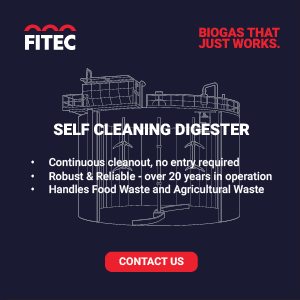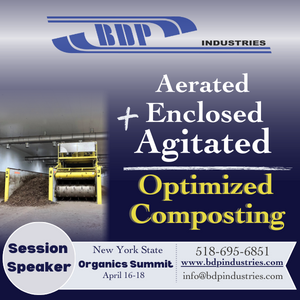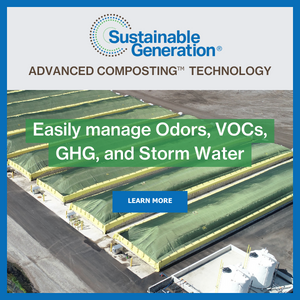City of Cupertino receives U.S. EPA Innovation Award for integrating its ambitious food waste reduction goals with its waste hauler.
Molly Farrell Tucker
BioCycle January 2014
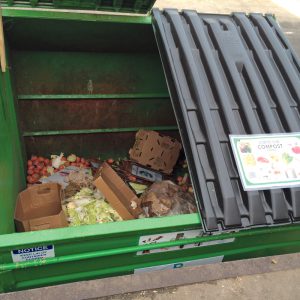
Seven grocery stores are participating in Cupertino’s Food Recovery Challenge (example of container above). A total of 2,000 tons of food waste has been diverted.
Photos courtesy of City of Cupertino
Cupertino is a small city with a population of approximately 60,000 located in Santa Clara County. The affluent city is home to Apple Inc.’s corporate headquarters. It was chosen out of 10 cities to receive the EPA award. “Thanks to Cupertino’s program, thousands of tons of food waste generated by businesses and residents are no longer sent to landfills,” said Jared Blumenfeld, Regional Administrator for U.S. EPA’s Pacific Southwest Office at the award ceremony. “Cupertino has proven that by working collaboratively with waste haulers and food markets, cities can dramatically reduce their food waste.”
Recology South Bay provides curbside recycling, garbage and yard trimmings services to the City of Cupertino and the unincorporated areas of Los Altos, Los Altos Hills and Cupertino. The City’s contract with Recology is for five years, from November 1, 2010 to October 31, 2015. Recology is eligible to request a five-year extension of its contract if the City’s diversion rate, (the percentage of waste reduced, reused, or recycled) is 75 percent by November 1, 2014, explains Cheri Donnelly, Environmental Programs Manager for the Public Works Department of the City of Cupertino. Diverting food waste from landfills is the city’s main strategy for reaching 75 percent.
In 2012, staff from the city, Recology and EPA conducted a workshop for local grocery stores and arranged site visits to demonstrate how businesses could incorporate food waste reduction into their operations. “The City has an ongoing outreach program whereby staff visits each food establishment within the city to provide support, education and educational materials (e.g. signage) to facilitate implementing food waste separation,” says Donnelly. “The City and Recology make it easy for stores and restaurants to separate food waste by providing the containers and education. Most businesses start separating when encouraged by this support system. In part, the City was commended by EPA for this innovative aspect of the City’s participation in the Food Recovery Challenge.” (The Food Recovery Challenge was launched in 2011 to assist businesses, organizations and communities reduce the generation of food waste and divert what is generated from disposal.)
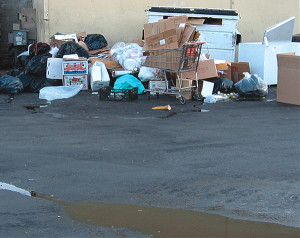
As part of its storm water pollution prevention outreach, the city visits trash areas at food establishments to illustrate how seepage (foreground) from food waste in trash could be contained by joining the source separation program.
Program Participation
Participation in the food waste source separation program — which involves separating organics, recyclables and trash into three bins — is voluntary. Businesses that volunteer to participate do not directly pay any more or any less for having the separated food wastes collected than they would if it were going to a landfill. Under its contract, Recology cannot charge businesses in Cupertino more than they were paying for nonseparated garbage. And, explains Donnelly, if separate bins for food wastes would cost the business more, Recology provides the bins at the same price as they charged for previous garbage service. “The caveat is that if the business expands in square footage then the price may increase as it normally would for non-separated garbage,” she adds.
Because the processing costs to convert food waste into compost are greater than those to landfill it, the City is evaluating the additional expenses incurred over the last three years. “Garbage rates may increase slightly over time to compensate for the special food waste processing,” says Donnelly. “However, there are other factors to consider that may counter the rising cost as more businesses participate, such as consolidating food waste collection routes and reducing contamination of recyclables and organics, as participating businesses become more proficient in mastering the three-bin separation process.”
Marina Food is one of seven grocery stores participating in Cupertino’s Food Recovery Challenge. The EPA estimates Marina Food alone has diverted about 520 tons of food waste annually from landfills since 2011. Overall, more than 2,000 tons of food waste have been diverted by all program participants. Marina Food employees separate food waste for Recology to collect and compost at Recology’s South Bay Organics facility in Gilroy, California. All types of food waste, including meat, fish and dairy can be included in the compostables containers. Food waste collection bins were also placed in the restaurant area for customers. Marina Food’s has complemented these actions by switching their on-site restaurant foam food ware to bagasse meal trays and by providing surplus produce to community food organizations twice a week.
“The City is proud to receive this honor from the EPA,” says Mayor Wong. “It has been a rewarding joint effort, locally with Recology, Marina Foods, and other Cupertino supermarkets through our two-year participation in the Food Recovery Challenge. Moreover, I commend the management and staff at Marina Foods for embracing the City’s composting and recycling goals to improve the sustainability of the Cupertino community.” The City is now expanding its outreach to restaurants.
The Food Recovery Challenge is part of EPA’s Sustainable Materials Management Program, which seeks to reduce the environmental impact of food and other widely-used everyday items through their entire life cycle, including how they are extracted, manufactured, distributed, used, reused, recycled and disposed. For more information visit www.epa.gov/foodrecovery.
Molly Farrell Tucker is a Contributing Editor to BioCycle.






